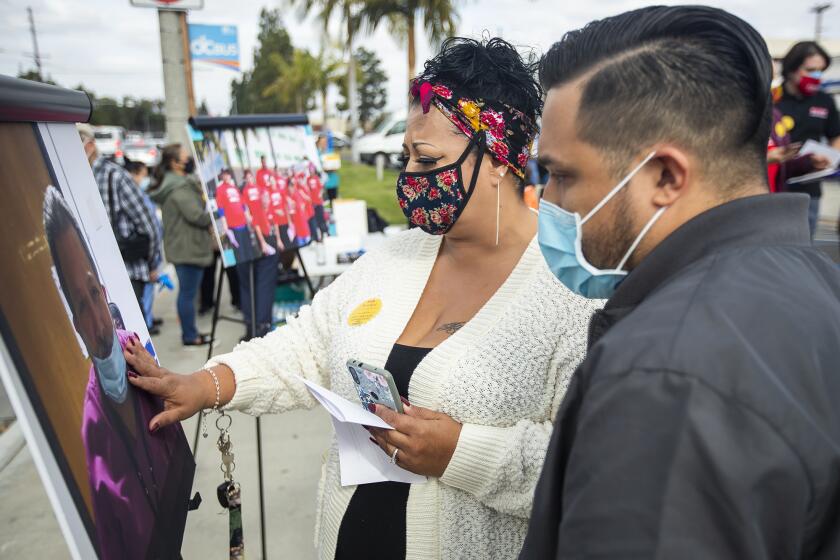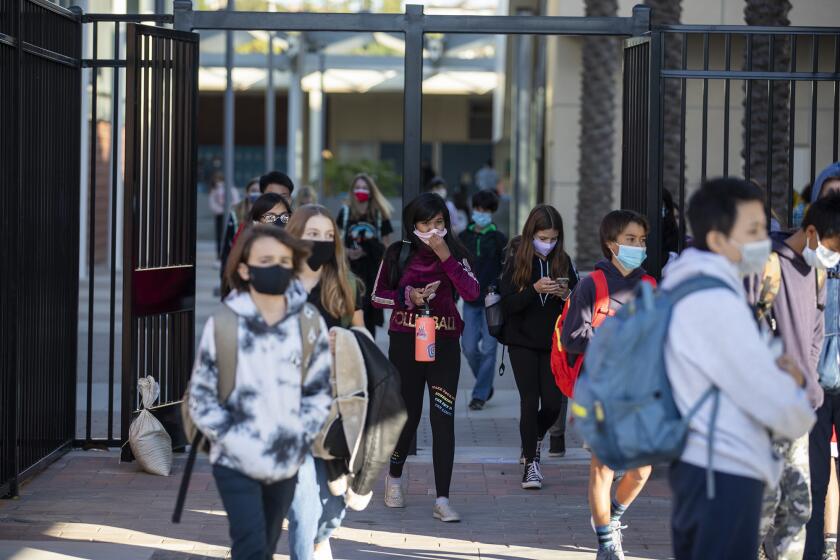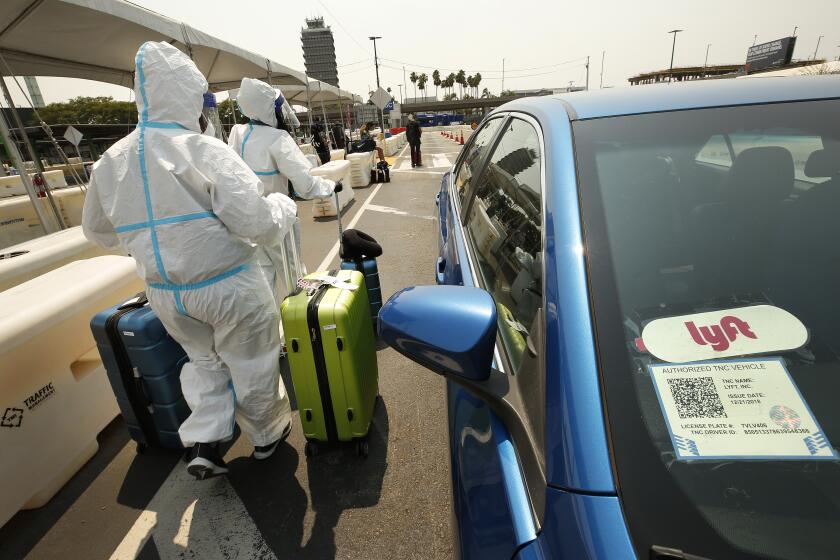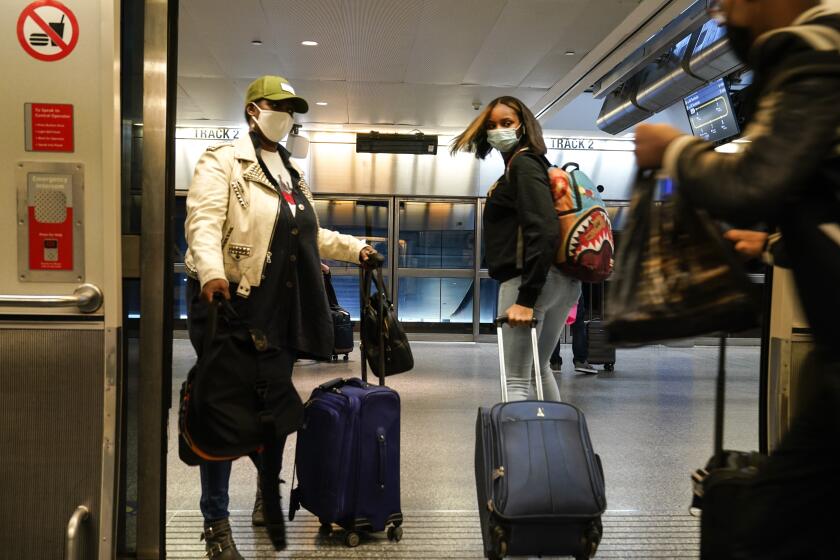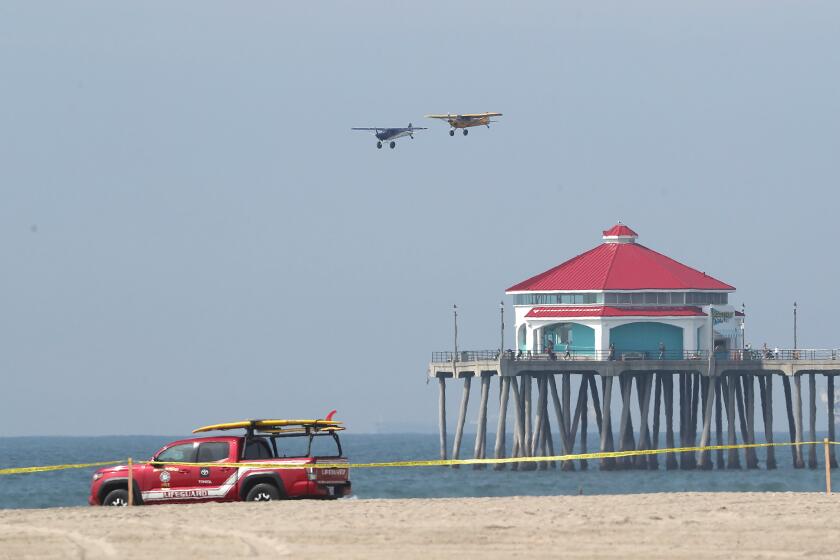How should you celebrate Thanksgiving in California during the COVID-19 pandemic?
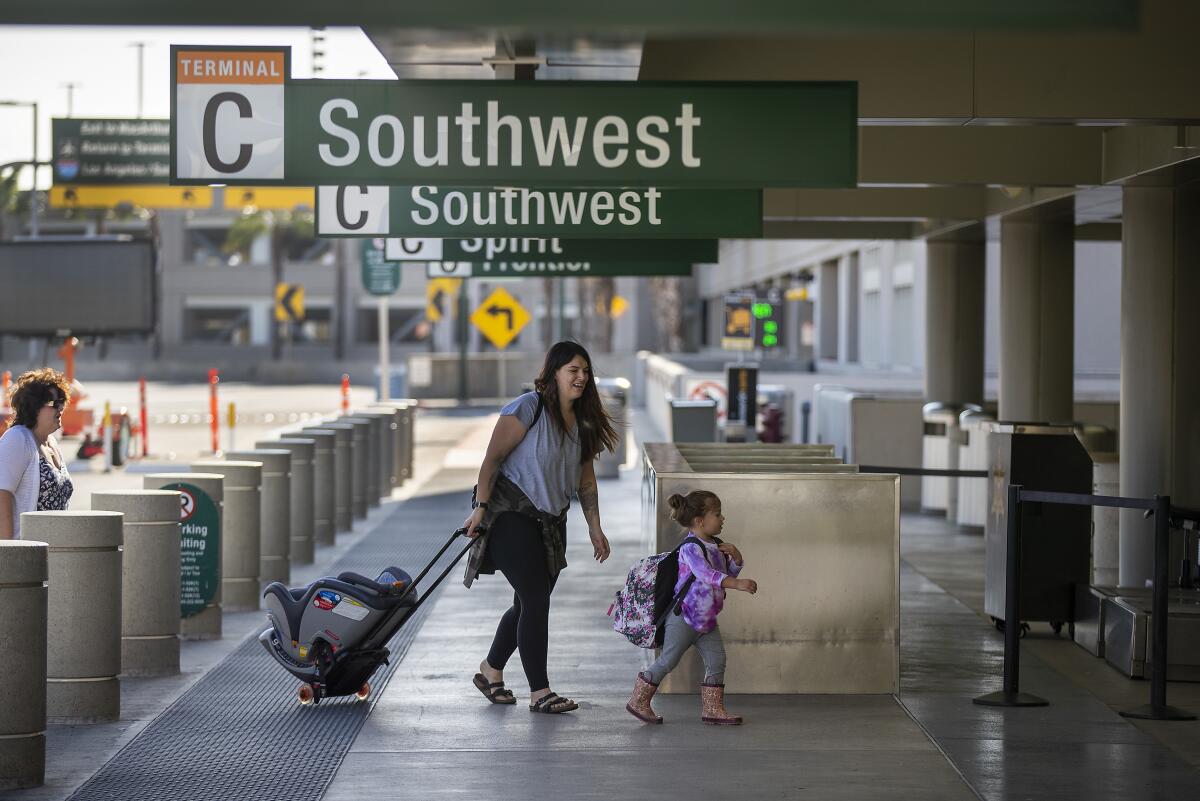
How should people try to manage a safer Thanksgiving amid the world’s worst pandemic in more than a century?
Federal, state and local officials are urging people to stay home for Thanksgiving and not travel — whether it be a flight across the country or a walk down the street to a neighbor’s home — to avoid transmitting the coronavirus.
Here’s a summary of tips on how to have a safer holiday:
Cancel your travel plans — it’s just not worth the risk
“The safest way to celebrate Thanksgiving is to celebrate at home with the people you live with,” said Barbara Ferrer, director of public health for Los Angeles County. “Given the huge surge in cases across the country this past week, we strongly recommend that you only celebrate the holiday with people from your household and that you not gather at all with people from outside your household to eat this meal — even if you’re outdoors.
As colleagues fall victim to the COVID-19, hospital employees say new patients and healthcare workers exposed to the virus should be tested in house. Meanwhile, O.C. rates continue to climb.
The U.S. Centers for Disease Control and Prevention and California Gov. Gavin Newsom have also urged people to stay with members of their households.
“Let’s just not see other households,” Los Angeles Mayor Eric Garcetti said. “Don’t travel across town because it seems like a short trip and all you’ve heard is you can’t travel nationally or regionally. Don’t travel at all.”
Garcetti urged people to travel only for essential reasons or for family emergencies. L.A. County officials have asked residents to stay at home as much as possible for the next few weeks and advised those who are medically vulnerable to have groceries and food delivered rather than going out.
College students, that goes for you, too
College students returning home just for the Thanksgiving holiday is extraordinarily risky, experts say, especially if their households include people who are elderly or have medical issues like high blood pressure, diabetes, obesity, high cholesterol, or kidney and lung disease.
Even if they don’t feel sick, people with the virus can be highly contagious and infect others who could develop severe complications and possibly die from COVID-19.
As Orange County set a new record Monday for 1,422 new infections in a single day, Newport-Mesa teachers urged officials to return middle and high schools to distance learning after Thanksgiving break.
With promising vaccines likely ready for wide distribution in just a few months, experts are imploring people to hold off on social gatherings for a while longer.
“Obviously, the preference is for people not to be flying home for the holidays — for students or for others — at this point in time,” Ferrer said.
She said some colleges are recommending that if students do return home for Thanksgiving, they stay there for the rest of the year and finish up the semester remotely online “so that you’re not really exposing lots more people when you come back.”
Quarantine if you plan an extended stay
Newsom issued an advisory asking those who arrive in California from another state or country to self-quarantine for 14 days.
If people decide to travel anyway — such as college students returning home for the next month or two — Ferrer said they should quarantine themselves in a room alone for 14 days, avoid sharing a bathroom or clean it every time if they do share one, not eat with others in the household, and have people in the home wear masks at all times indoors.
If the students haven’t been able to quarantine for 14 days at their destination, Ferrer suggested they not take part in Thanksgiving festivities to reduce the chance of infecting others.
Airports, train stations and rest stops are places where people are at risk of being exposed to the virus, and it can be difficult to stay six feet away from others, as health experts strongly recommend.
“We still urge college students to please not return just for the Thanksgiving holiday,” Ferrer said. “There may be some people that are returning and planning to stay here and they’re not going back to their schools — in which case they have plenty of time to do that 14-day self-quarantine.”
For people returning home to California after a trip, a 14-day quarantine is advised, and that means staying at home as much as possible, and not leaving to go to the grocery store or to restaurants. Instead, people in quarantine should order food to be delivered, Ferrer said.
During quarantine, you can go out for a walk by yourself, said Ferrer, as long as you don’t come in contact with other people. “We don’t want you going to restaurants and sitting and eating outside. And we don’t want you going into retail establishments, either, when we’ve asked you to quarantine.”
“The tighter you can restrict your activities over those 14 days, the better off we all are,” Ferrer said.
Despite emphatic warnings from officials to stay home for Thanksgiving, millions of Americans are crowding the nation’s airports ahead of the holiday.
Negative coronavirus tests can be misleading
Don’t let a negative coronavirus test lull you into thinking you don’t have the virus without a full 14-day quarantine.
A negative result simply means the test hasn’t detected the virus in your body. It’s possible that the virus is actually there and the test just didn’t find it. This can happen during the early stages of infection, when virus levels are too low to be detected. .
That’s why a negative test does not give you a pass to end the 14-day quarantine early, Ferrer said.
“Unfortunately, you can’t ‘test out’ of quarantine, as much as people would like to,” Ferrer said. “Because it’s a 14-day incubation period, that really means that from the time of your last exposure to the virus ... it could take the full 14 days for you to be able to actually test positive for the virus.”
When tests can be helpful
Tests are particularly helpful, obviously, if you start to feel sick. “The quicker people are able to know that they’re a case, the quicker we can do contact tracing for people who may have had an exposure to you,” Ferrer said, which helps warn people you’ve had close contact with that they might be infected and take action.
Many of us will spend the holiday season the same way we’ve spent most of 2020: at home. Here are some ideas to make it special while staying safe.
If you do decide to hold a Thanksgiving meal anyway with people from other households, how can you make it safer?
California has announced the following mandatory requirements and recommendations for gatherings in counties in the most restrictive “purple” tier, which covers about 93% of the state’s population:
- Gatherings must be held outside and involve no more than three households. L.A. County has a separate rule restricting such gatherings to no more than 15 people.
- The space must be large enough so that everyone can maintain at least a six-foot distance from others that don’t live in their household.
- Shared items should be minimized, and food and beverages must be served by someone wearing a face covering who should wash their hands often.
- Face coverings must be worn, and removed only when people are actively eating or drinking.
- Gatherings should be kept to two hours or less. “The longer the duration, the risk of transmission increases,” the state says.
Rong-Gong Lin II is a staff writer with the Los Angeles Times.
All the latest on Orange County from Orange County.
Get our free TimesOC newsletter.
You may occasionally receive promotional content from the Daily Pilot.
